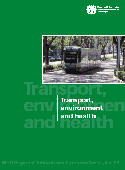Transport, environment and health

Download
Edited by Carlos Dora & Margaret Phillips
WHO Regional Publications, European Series, No. 89
2000, iv + 82 pages
ISBN 92 890 1356 7
This publication is only available online.
Transport eases access to jobs, education, markets, leisure and other services, and has a key role in the economy. Nevertheless, road users generate excessive costs to themselves, other individuals and society - through noise, pollution and accidents - in the form of illness, injuries, deaths and damage to mental health and social relationships. The continuing expansion of motorized transport in Europe today raises crucial questions about the efficiency and the environmental, health and social implications of land-use and transport policies. Too often, such policies disregard these implications.
The challenge is to promote healthy and sustainable transport alternatives to prevent the negative effects of transport systems on human health. Meeting this challenge requires commitment and action from governments. This book summarizes the key facts on which countries should act. It summarizes the latest scientific evidence on the impact of transport-generated air pollution, noise and accidents on behaviour and physical and mental health. The book also highlights the considerable potential health benefits from non-motorized forms of transport, such as cycling and walking.
This book can alert policy analysts, decision-makers and politicians to current knowledge, and point the way to action for sustainable transport. It calls for policies that require the creators of transport-related costs to pay for them, and take proper account of environment and health implications in decisions on transport infrastructure and urban development. These and other steps are needed if Europe is to reduce ill health and realize the potential for transport to serve society's needs and promote people's health.



